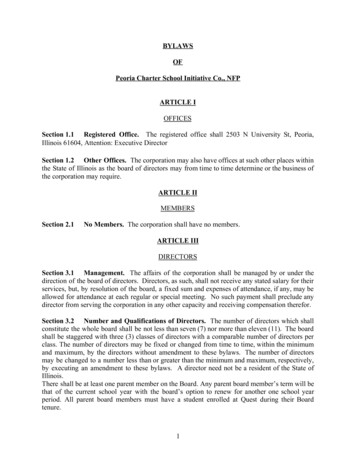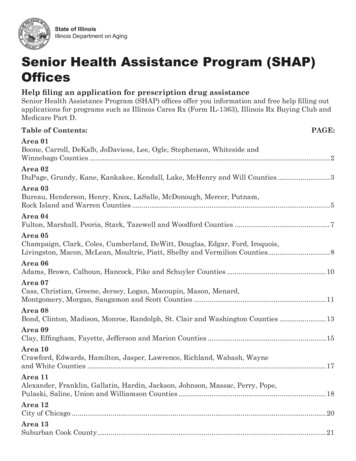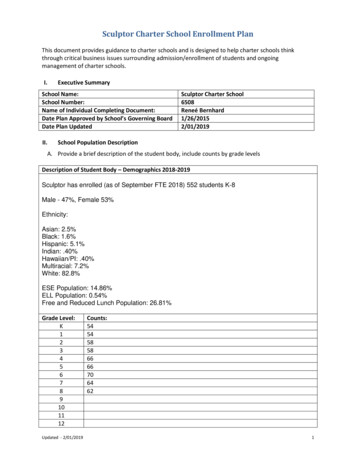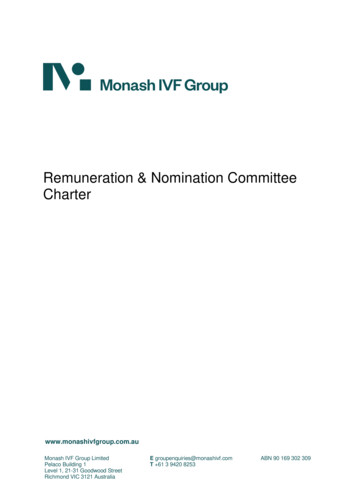
Transcription
BYLAWSOFPeoria Charter School Initiative Co., NFPARTICLE IOFFICESSection 1.1 Registered Office. The registered office shall 2503 N University St, Peoria,Illinois 61604, Attention: Executive DirectorSection 1.2 Other Offices. The corporation may also have offices at such other places withinthe State of Illinois as the board of directors may from time to time determine or the business ofthe corporation may require.ARTICLE IIMEMBERSSection 2.1No Members. The corporation shall have no members.ARTICLE IIIDIRECTORSSection 3.1 Management. The affairs of the corporation shall be managed by or under thedirection of the board of directors. Directors, as such, shall not receive any stated salary for theirservices, but, by resolution of the board, a fixed sum and expenses of attendance, if any, may beallowed for attendance at each regular or special meeting. No such payment shall preclude anydirector from serving the corporation in any other capacity and receiving compensation therefor.Section 3.2 Number and Qualifications of Directors. T he number of directors which shallconstitute the whole board shall be not less than seven (7) nor more than eleven (11). The boardshall be staggered with three (3) classes of directors with a comparable number of directors perclass. The number of directors may be fixed or changed from time to time, within the minimumand maximum, by the directors without amendment to these bylaws. The number of directorsmay be changed to a number less than or greater than the minimum and maximum, respectively,by executing an amendment to these bylaws. A director need not be a resident of the State ofIllinois.There shall be at least one parent member on the Board. Any parent board member’s term will bethat of the current school year with the board’s option to renew for another one school yearperiod. All parent board members must have a student enrolled at Quest during their Boardtenure.1
Section 3.3 Tenure and Vacancies of Directors.Subject to the immediatelyfollowing sentence, the term of each director shall be three (3) years and no director may servemore than two (2) terms. Notwithstanding the immediately preceding sentence, the Board maypermit the Board President or other officers of the Board to serve as a director for more than two(2) terms. Any vacancy occurring in the board of directors and any directorship to be filled byreason of an increase in the number of directors may be filled by the board of directors. Theterm of a director elected to fill a vacancy shall expire at the expiration of the vacant directorshipsuch replacement director fills. The term of a director elected as a result of an increase in thenumber of directors shall expire at the next meeting of directors for the election of directors.Any director elected to fill a vacancy or elected as a result of an increase in the number ofdirectors shall not be prohibited from being elected and from serving up to two (2) full three (3)year terms, not including the period of time in which such director served as a replacementdirector or additional director. Despite the expiration of a director's term, he or she continues toserve until his or her successor shall have been elected.Section 3.4 Resignation. A director may resign at any time by written notice delivered to theboard of directors, the president, or the secretary of the corporation. Notwithstanding Section4.1, a resignation is effective when the notice is delivered unless the notice specifies a futuredate. The pending vacancy may be filled before the effective date, but the successor shall nottake office until the effective date.Section 3.5 Removal. A director may be removed by the affirmative vote of a majority of thedirectors then in office present (either physically or remotely as described in Section 3.7) andvoting at a meeting of the board of directors at which a quorum is physically present and whichhas been properly noticed in accordance with Section 3.9. In addition, if any director fails toattend (either physically or remotely as described in Section 3.7) five (5) regular meetings in anyparticular fiscal year, a special meeting shall be called in accordance with Section 3.8 andSection 3.9 to remove such director and elect a replacement director.Section 3.6 Quorum of directors. One-third of the directors then in office and physicallypresent at a meeting shall constitute a quorum for the transaction of business at any meeting ofthe directors. If a quorum shall not be physically present at any meeting of the board ofdirectors, the directors present thereat may not take any binding action and may adjourn themeeting until a quorum shall be present.Section 3.7 Manner of Acting. The act of the majority of the directors present (eitherphysically or remotely as described in this Section) at a meeting at which a quorum is presentshall be the act of the board of directors. Directors may remotely participate in and act at anymeeting of the board through the use of a conference telephone or other communicationsequipment by means of which all persons participating in the meeting can communicate witheach other provided that (i) a quorum of the board is physically present at the meeting; (ii) amajority of the board permits such remote participation; and (iii) the director seeking toparticipate remotely is prevented from physically attending by (a) personal illness or disability;(b) employment purposes or the business of the corporation; or (c) a family or other emergency.2
Participation in such meeting shall constitute attendance and presence in person at the meeting ofthe person or persons so participating.Section 3.8 Meetings. Regular meetings of the board of directors shall be held once everytwo months with an executive committee meeting held on the off months. on the dates, at thetimes, and at the locations specified in the notice for such meetings given at the beginning of theapplicable fiscal year. Special meetings of the board of directors may be called by or at therequest of the president or any director. The date, time, and location of such special meetingshall be as provided for in the notice for such special meeting.Section 3.9 Notice of Meetings. Notice of the date, time, and location of each regularmeeting for a given fiscal year shall be delivered at the beginning of such fiscal year by notice toeach director. Notice of any change to the date, time, or location of any regular meeting shall begiven at least ten (10) days prior to the date the affected meeting shall be held by notice to eachdirector. Notice of the date, time, and location of any special meeting of the board of directorsshall be given at least forty-eight (48) hours prior to the date thereof by notice to each director,unless such special meeting is held as a result of a bona fide emergency. If a meeting isadjourned for failure of a quorum to be physically present, notice of any reconvened meetingmust be given at least forty-eight (48) hours prior to the date such reconvened meeting shall beheld; provided, however, that notice shall not be required if the adjourned meeting was open tothe public and (i) an announcement of the time and place of such reconvened meeting wasannounced at the adjourned meeting and there is no change in the agenda; or (ii) suchreconvened meeting is to be held within twenty-four (24) hours. Neither the business to betransacted at, nor the purpose of, any regular or special meeting of the board of directors need bespecified in the notice or waiver of notice of such meeting; provided, however, that no specialmeeting of directors may remove a director unless written notice of the proposed removal isdelivered to all directors at least twenty (20) days prior to such meeting. An agenda of eachregular and special meeting shall be provided at least forty-eight (48) hours in advance of themeeting.Section 3.10 Presumption of Assent. A director of a corporation who is present at a meetingof its board of directors at which action on any corporate matter is taken is conclusivelypresumed to have assented to the action taken unless his or her dissent or abstention is entered inthe minutes of the meeting or unless he or she files his or her written dissent or abstention tosuch action with the person acting as the secretary of the meeting before the adjournment thereofor forwards such dissent or abstention by registered or certified mail to the secretary of thecorporation immediately after the adjournment of the meeting. Such right to dissent or abstaindoes not apply to a director who voted in favor of such action.ARTICLE IVNOTICESSection 4.1 Written Notice. Whenever notice is required to be delivered to any director, itshall not be construed to require personal notice, but such notice may be delivered personally, inwriting, by mail, by facsimile, by telegram, or by other written or electronic means, addressed to3
such director, at his address at it appears on the records of the corporation, with postage thereonprepaid, and such notice shall be deemed to be delivered at the time when the same shall be sent.Section 4.2 Waiver. Whenever any notice is required to be delivered, a waiver thereof inwriting, signed by the person or persons entitled to such notice, whether before or after the timestated therein, shall be deemed equivalent thereto. Attendance of a director at any meeting shallconstitute a waiver of notice of such meeting except where a director attends a meeting for theexpress purpose of objecting to the transaction of any business because the meeting is notlawfully called or convened.Section 4.3 Notice to Corporation. Any notice to be provided by a director or officer to thecorporation under these bylaws shall be provided to Peoria Charter School Initiative Co., NFP,2503 N. University St. Peoria, Illinois 61604, Attention: Principal.ARTICLE VOFFICERSSection 5.1 Officers. The officers of the corporation shall be elected by the board of directorsand shall be a president, a secretary, and a treasurer. The board may also choose one or morevice presidents and one or more assistant secretaries and assistant treasurers. Any number ofoffices may be held by the same person and an officer need not be a member of the board ofdirectors. The board of directors may elect such other officers and agents as it shall deemdesirable who shall hold their offices for such terms and shall exercise such powers and performsuch duties as shall be determined from time to time by the board.Section 5.2 Powers. All officers of the corporation, as between themselves and thecorporation, shall have such express authority and perform such duties in the management of theproperty and affairs of the corporation as is provided in these bylaws, or as may be determinedby resolution of the board of directors not inconsistent with the bylaws and such impliedauthority as recognized by the common law from time to time.Section 5.3 Election, Term of Office, and Removal. The officers of the corporation shallhold office until their successors are elected by the board. Any officer may be removed by theboard but such removal shall be without prejudice to the contract rights, if any, of the person soremoved. Election of an officer shall not of itself create any contract rights. Any vacancyoccurring in any office of the corporation shall be filled by the board of directors.Section 5.4 President. The president shall be the chief executive officer of the corporation,the chairman of the board and, subject to the direction and control of the board, shall havegeneral and active management of the business of the corporation and shall see that all ordersand resolutions of the board of directors are carried into effect. In the absence of the president,or in the event of his inability to act, the vice president (or if there is no vice president able to act,the treasurer) shall perform the duties and exercise the powers of the president.Section 5.5Vice President.The vice-president (or in the event there be more than one4
vice-president, each of the vice-presidents) shall assist the president in the discharge of his dutiesas the president may direct and shall perform such duties and have such powers as the board ofdirectors may prescribe. In the absence of the president, or in the event of his inability to act, thevice president shall perform the duties and exercise the powers of the president. In the absenceof the vice-president, or in the event of his inability to act, the treasurer shall perform the dutiesand exercise the powers of the vice-president.Section 5.6 Secretary. The secretary shall (i) attend all meetings of the board and record theproceedings thereof in a book kept for that purpose; (ii) give, or cause to be given, notice ofspecial meetings of the board; (iii) be a custodian of the corporate records and of the seal of thecorporation; and (iv) perform such other duties and have such other powers as may be prescribedby the board of directors or the president.Section 5.7 Treasurer. The treasurer shall be the principal accounting and financial officerof the corporation. The treasurer shall: (i) have charge of and be responsible for the maintenanceof adequate books of account for the corporation; (ii) have charge and custody of the corporatefunds and securities and keep full and accurate accounts of receipts and disbursements; and (iii)perform such other duties and have such other powers as may be prescribed by the board ofdirectors or the president. In the absence of the vice-president, or in the event of his inability toact, the treasurer shall perform the duties and exercise the powers of the vice-president.Section 5.8 Assistant Secretaries and Assistant Treasurers. The assistant secretaries andassistant treasurers may, in the absence of the secretary or treasurer, respectively, or in the eventof the secretary’s or treasurer’s inability to act, perform the duties and exercise the powers of thesecretary or treasurer, respectively, and shall perform such other duties and have such otherpowers as the board of directors, the president, or the secretary or treasurer, respectively, mayprescribe.ARTICLE VIINDEMNIFICATIONSection 6.1 Indemnification in actions other than by or in the right of the Corporation.The corporation may indemnify any person who was or is a party, or is threatened to be made aparty to any threatened, pending or completed action, suit or proceeding, whether civil, criminal,administrative or investigative (other than an action by or in the right of the corporation) byreason of the fact that he or she is or was a director, officer, employee or agent of thecorporation, or who is or was serving at the request of the corporation as a director, officer,employee or agent of another corporation, partnership, joint venture, trust or other enterprise,against expenses (including attorneys' fees), judgments, fines and amounts paid in settlementactually and reasonably incurred by such person in connection with such action, suit orproceeding, if such person acted in good faith and in a manner he or she reasonably believed tobe in, or not opposed to, the best interests of the corporation, and, with respect to any criminalaction or proceeding, had no reasonable cause to believe his or her conduct was unlawful. Thetermination of any action, suit or proceeding by judgment, order, settlement, conviction, or upona plea of nolo contendere or its equivalent, shall not, of itself, create a presumption that the5
person did not act in good faith and in a manner which he or she reasonably believed to be in ornot opposed to the best interests of the corporation or, with respect to any criminal action orproceeding, that the person had reasonable cause to believe that his or her conduct was unlawful.Section 6.2 Indemnification in actions by or in the right of the Corporation. Thecorporation may indemnify any person who was or is a party, or is threatened to be made a partyto any threatened, pending or completed action or suit by or in the right of the corporation toprocure a judgment in its favor by reason of the fact that such person is or was a director, officer,employee or agent of the corporation, or is or was serving at the request of the corporation as adirector, officer, employee or agent of another corporation, partnership, joint venture, trust orother enterprise, against expenses (including attorneys' fees) actually and reasonably incurred bysuch person in connection with the defense or settlement of such action or suit, if such personacted in good faith and in a manner he or she reasonably believed to be in, or not opposed to, thebest interests of the corporation, provided that no indemnification shall be made in respect of anyclaim, issue or matter as to which such person shall have been adjudged to be liable fornegligence or misconduct in the performance of his or her duty to the corporation, unless, andonly to the extent that the court in which such action or suit was brought shall determine uponapplication that, despite the adjudication of liability, but in view of all the circumstances of thecase, such person is fairly and reasonably entitled to indemnity for such expenses as the courtshall deem proper.Section 6.3 Right to Payment of Expenses. To the extent that a present or former director,officer or employee of a corporation has been successful, on the merits or otherwise, in thedefense of any action, suit or proceeding referred to in Section 6.1 or 6.2, or in defense of anyclaim, issue or matter therein, such person shall be indemnified against expenses (includingattorneys' fees) actually and reasonably incurred by such person in connection therewith, if thatperson acted in good faith and in a manner he or she reasonably believed to be in, or not opposedto, the best interests of the corporation.Section 6.4 Determination of Conduct. Any indemnification under Section 6.1, 6.2, or 6.3(unless ordered by a court) shall be made by the corporation only as authorized in the specificcase, upon a determination that indemnification of the present or former director, officer,employee or agent is proper in the circumstances because he or she has met the applicablestandard of conduct set forth in Section 6.1, 6.2, or 6.3. Such determination shall be made withrespect to a person who is a director or officer of the corporation at the time of the determination:(i) by the majority vote of the directors who are not parties to such action, suit or proceeding,even though less than a quorum; (ii) by a committee of such directors, even though less than aquorum, designated by a majority vote of such directors; or (iii) if there are no such directors, orif such directors so direct, by independent legal counsel in a written opinion.Section 6.5 Payment of Expenses in Advance. Expenses (including attorney's fees)incurred by an officer or director of the corporation in defending a civil or criminal action, suit orproceeding may be paid by the corporation in advance of the final disposition of such action, suitor proceeding, as authorized by the board of directors in the specific case, upon receipt of anundertaking by or on behalf of such director or officer to repay such amount, unless it shallultimately be determined that such person is entitled to be indemnified by the corporation as6
authorized in this Article. Such expenses (including attorney's fees) incurred by former directorsand officers or other employees and agents of the corporation or by persons serving at the requestof the corporation as directors, officers, employees or agents of another corporation, partnership,joint venture, trust or other enterprise may be so paid on such terms and conditions, if any, as thecorporation deems appropriate.Section 6.6 Indemnification not Exclusive. The indemnification and advancement ofexpenses provided by or granted under the other subsections of this Article shall not be deemedexclusive of any other rights to which those seeking indemnification or advancement of expensesmay be entitled under any bylaw, agreement, vote of disinterested directors, or otherwise, both asto action in his or her official capacity and as to action in another capacity while holding suchoffice. A right to indemnification or to advancement of expenses arising under a provision of thearticles of incorporation or these bylaws shall not be eliminated or impaired by an amendment tosuch provision after the occurrence of the act or omission that is the subject of the civil, criminal,administrative or investigative action, suit or proceeding for which indemnification oradvancement of expenses is sought, unless the provision in effect at the time of such act oromission explicitly authorizes such elimination or impairment after such act or omission hasoccurred.Section 6.7 Insurance. The corporation may purchase and maintain insurance on behalf ofany person who is or was a director, officer, employee or agent of the corporation, or who is orwas serving at the request of the corporation as a director, officer, employee or agent of anothercorporation, partnership, joint venture, trust or other enterprise, against any liability assertedagainst such person and incurred by such person in any such capacity, or arising out of his or herstatus as such, whether or not the corporation would have the power to indemnify such personagainst such liability under the provisions of this Article.Section 6.8 Continuation and Inurement. The indemnification and advancement ofexpenses provided by or granted under this Article shall, unless otherwise provided whenauthorized or ratified, continue as to a person who has ceased to be a director, officer, employee,or agent and shall inure to the benefit of the heirs, executors and administrators of that person.ARTICLE VIIGENERAL PROVISIONSSection 7.1 Amendment. The articles of incorporation or bylaws of the corporation may beamended by the board of directors upon receiving the affirmative vote of a majority of thedirectors in office at any regular or special meeting for which written notice of the purpose shallbe given; provided, however that any amended articles of incorporation or bylaws may containonly such provisions as are required or permitted in the original articles of incorporation at thetime of amendment.7
Peoria Charter School Initiative Co., NFP ARTICLE I OFFICES Section 1.1 Registered Office. The registered office shall 2503 N University St, Peoria, Illinois 61604, Attention: Executive Director Section 1.2 Other Offices. The corporation may also have offices at such other places within the State of Illinois as the board of directors may from .










